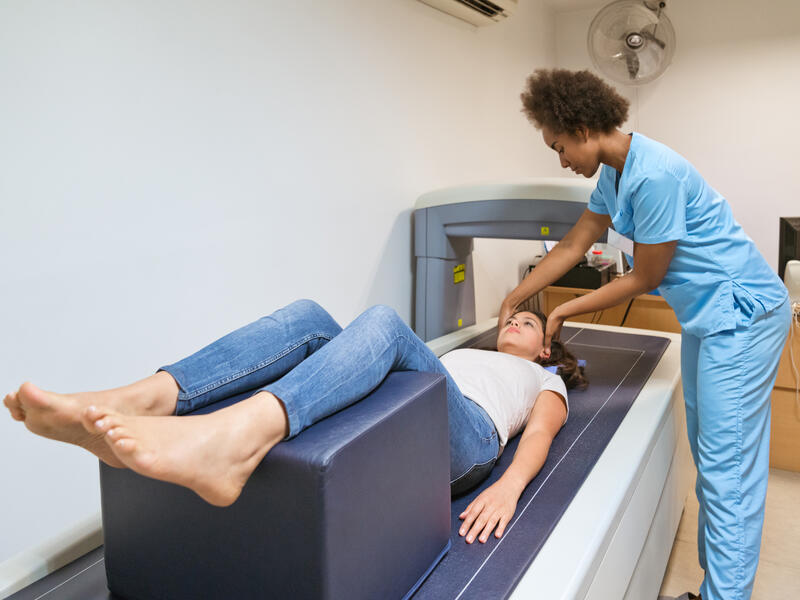When you were a child, you probably heard something along the lines of, “drink your milk, take your vitamins – you need strong bones.”
Turns out, the importance of building and maintaining strong bones goes well beyond childhood, according to Sanford Health’s Kelly Pruett, APRN, CNP.
Something everyone faces
Pruett said everyone is affected by bone health. People typically start to lose bone “after the age of 30.”

Pruett said women are at higher risk than men of bone breaks and developing osteoporosis – a disease that weakens bones.
“Essentially 50% of women are going to experience a fragility fracture in their lifetime, which is a break due to having weak bones,” he said.
Outside opinions also agree. The Bone Health and Osteoporosis Foundation says osteoporosis affects half of all women over the age of 50, and a quarter of all men.
Pruett says menopause plays a part.
“In the first five to seven years after menopause, women can lose up to 20% of their bone mass,” he explained.
He said men are less likely to experience a bone break in part due to their size, as men are on average bigger than women, thus have a bigger bone structure. Also, a 2017 study by the National Institutes of Health said women have been found to lose bone mass at younger ages and faster rates than men.
What affects bone health?
Pruett said as we age, we’re more prone to bone breaks; we can’t replace bone cells as fast as we did when we were younger.
“We’re creating this deficit over time. You do that long enough, your bones will get thin and weak,” said Pruett.
Lifestyle plays a critical role in slowing down the loss of bone, and Pruett said choices that can slow down bone loss include:
- Eating healthy, calcium-rich foods
- Being active
- Not smoking
- Not drinking more than three alcoholic beverages per day
“Did you have a family member or loved one that fell and broke their hip as they got older? Genetics play a role,” explained Pruett.
Related: Keeping your bones healthy through menopause
He also said disease processes are a factor.
“Cancer, specifically breast cancer and prostate cancer in men, how we treat those affects bone health. Any kind of autoimmune (disease) like rheumatoid arthritis where you’re taking medications that are suppressing your immune response, those are very hard on bone,” Pruett explained.
Pruett said maintaining strength as we age goes hand-in-hand with preventing bone breaks.
“If you don’t fall, the majority of the time you’re not going to break. 95% of hip fractures are from a fall. So, if you can keep muscle strength and bone strength through exercise and you don’t fall, you’re not going to fracture,” said. Pruett.
Can supplements help?
Supplements are a billion-dollar industry. Grand View Research said the global dietary supplement market topped out at $177.5 billion in 2023 and is projecting a 9.1% increase by 2024’s end.
It’s natural to wonder if adding a supplement to your diet can help.
The supplements that reign supreme according to Pruett? Calcium and vitamin D.
And the two go hand-in-hand.
“You need roughly 1,000 to 1,200 milligrams of calcium a day, but that needs to be divided. You can’t take it all at once. I’d rather they (patients) get it through calcium rich foods like yogurt and cheese, almonds, dark leafy greens like broccoli, kale, or spinach,” he said.
Certain drinks like milk, almond milk or soy milk, as well as orange juice, also contain a good amount of calcium.
But here’s the thing: Vitamin D helps absorb calcium, so if you don’t have adequate vitamin D, it won’t matter how much calcium you take.
Foods high in vitamin D include:
- Fish
- Eggs
- Mushrooms
- Milk
- Soy milk
- Orange juice
- Cereal and oatmeal
“I just got back from a big bone health conference, and the only thing we talked about was calcium and vitamin D,” said Pruett.
Common misconceptions
The biggest misconception Pruett sees is people thinking they are going to improve their bone density. Osteoporosis is a disease of aging, and no one is getting any younger.
“You can slow it down, but you’re not going to stop it,” said Pruett.
There are also no signs or symptoms of osteoporosis.
“The scary part is you have no idea you have it until one of two things happens: you’ve either been screened by a DEXA scan – a special X-ray that measures bone density – or you fall and break a bone after the age of 50,” said Pruett.
When to get screened
Pruett recommends any woman who is postmenopausal with risk factors for osteoporosis, a man aged 50-69 with risk factors of osteoporosis, women aged 65 or older and men 70 years and over without risk factors, and any person over the age of 50 who has broken a bone as an adult be screened for osteoporosis.
Pruett said Sanford Health’s team of experts are there to help.
“I’m dedicated to osteoporosis specifically, and there’s really not a ton of those programs across the country. When I was at the recent bone health conference out in Santa Fe, New Mexico, there’s really not a ton of providers that dedicate their practice to osteoporosis or bone health like Sanford does.
“We have three of them within our four major hospital systems,” he said.
It’s also easy to access Pruett and other experts.
“You don’t need a referral to see us. If you have questions about your bones, just come see us or make a phone call and we can help you.”
Learn more
- Grateful patient finds bone-building drug at Sanford Health
- How to combat vitamin D deficiency during short winter days
- A Matter of Balance: What goes into fall prevention?
…
Posted In Bemidji, Menopause Care, Orthopedics
